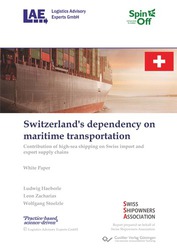| Areas | |
|---|---|
| Serie de libros (97) |
1381
|
| Nachhaltigkeit |
3
|
| Gesundheitswesen |
1
|
| Letra |
2370
|
| Medienwissenschaften | 16 |
| Teología | 57 |
| Filosofía | 102 |
| Derecho | 423 |
| Economía | 852 |
| Ciencias sociales | 417 |
| Ciencias del deporte | 48 |
| Psicología | 233 |
| Educación | 190 |
| Historia | 183 |
| Arte | 111 |
| Ciencias culturales | 166 |
| Literatur | 117 |
| Lingüística | 88 |
| Ciencias Naturales |
5408
|
| Ciencias Ingeniería |
1796
|
| General |
98
|
|
Leitlinien Unfallchirurgie
5. Auflage bestellen |
|
Erweiterte Suche
Switzerland's dependency on maritime transportation (Tienda española)
Contribution of high-sea shipping on Swiss import and export supply chains
Ludwig Häberle (Autor)Wolfgang Stölzle (Autor)
Leon Zacharias (Autor)
Previo
Lectura de prueba, PDF (840 KB)
Indice, PDF (92 KB)
The importance of maritime shipping for the Swiss economy is not reflected in official statistics of the Swiss Federal Customs Administration – high-sea vessels are not registered as a mode of transport for the import and export of goods to and from Switzerland. Thus, the primary study objective is to highlight the importance of high-sea shipping for the trade flows of the Swiss Confederation. Therefore, quantities and values of Switzerland’s maritime trade flows will be estimated differentiated by commodity groups and vessel types including trends in the maritime sector relevant for the Swiss Confederation.
More than 90% of the total volume of intercontinental trade between Switzerland and its trading partners is carried by ocean-going vessels. High-sea shipping dependency is not to be reduced to intercontinental trade flows only. Due to upstream and downstream transport stages that are a directly part of a supply chain configuration, substantial proportions of continental foreign trade depend on high-sea shipping as well.
Die Bedeutung der maritimen Schifffahrt für die Schweizer Volkswirtschaft spiegelt sich nicht in offiziellen Statistiken der Eidgenössischen Zollverwaltung – Hochseeschiffe werden nicht als Verkehrsträger für den Im- und Export von Waren in und aus der Schweiz registriert. Primäres Ziel der Studie ist es daher, die Bedeutung der Hochseeschifffahrt für die Handelsströme der Schweizerischen Eidgenossenschaft aufzuzeigen. Hierzu werden Mengen und Werte der maritimen Handelsströme der Schweiz differenziert nach Warengruppen und Schiffstypen abgeschätzt und relevante Trends im maritimen Sektor aufgezeigt.
Im Interkontinentalhandel zwischen der Schweiz und ihren Handelspartnern werden mehr als 90% des Gesamttransportvolumens werden per Seeschiff abgewickelt. Die Abhängigkeit der Schweiz von der Hochseeschifffahrt ist nicht nur auf interkontinentale Handelsströme zu reduzieren. Aufgrund der vor- und nachgelagerten Transportstufen, die unmittelbar Teil einer Supply-Chain-Konfiguration sind, sind zudem erhebliche Anteile des kontinentalen Außenhandels von der Hochseeschifffahrt abhängig.
| ISBN-13 (Impresion) | 9783736973831 |
| ISBN-13 (E-Book) | 9783736963832 |
| Formato | A4 |
| Idioma | Inglés |
| Numero de paginas | 46 |
| Laminacion de la cubierta | mate |
| Edicion | 1 |
| Lugar de publicacion | Göttingen |
| Fecha de publicacion | 08.03.2021 |
| Clasificacion simple | Libro de divulgacion |
| Area |
Economía
Economía y ciencias políticas Teoría de la empresa Economía política |
| Palabras claves | Seeschifffahrt, Außenhandel, Import, Export, Lieferketten, Hochseeschifffahrt, Schweiz, Internationaler Transport, Luftfracht, Massengüter, Containerisierung, Welthandel, Eidgenössische Zollverwaltung, EZV, Seeschiffe, Handel, Transport, Trockenes Massengut, Flüssiges Massengut, Container, Schweizerischer Reederverband, Abhängigkeit der Schweiz von der Seeschifffahrt, MSC, Beitrag der Hochseeschifffahrt zu den Schweizer Import- und Exportlieferketten, Weißbuch, Experten, Wolfgang Stölzle, Supply Chain Management an der Universität St.Gallen, Logistik, Güterarten, Warengruppen, Import- und Exportvolumen, Import- und Exportwert, Entwicklung, Trends, Waren, Triangulation, Interkontinentale Handelsströme, Verkehrsträger, Wirtschaft, Schifffahrtsnation, Handelsflotte, Offizielle Statistiken, Maritime shipping, maritime vessels, Swiss, Switzerland, foreign trade, Import, Export, Supply chains, High-sea shipping, Switzerland, Foreign transport, airfreight, Bulk cargoes, Containerisation, World trade, Swiss Federal Customs Administration, EZV, Trading, transportation, Dry bulk, Liquid bulk, Container, Swiss Shipowner Association, Switzerlands dependency on maritime trade, MSC, Contribution of high-sea shipping on Swiss import and export supply chains, White Paper, Logistics Advisory Experts, Wolfgang Stölzle, Supply Chain Management, University of St.Gallen, Logistics, Commodity types, Import and export volume, Import and export value, Evolution, Trends, Seaborn goods , triangulation, Intercontinental trade flows, Importance of high-sea shipping, Modes of transport, Swiss economy, Shipping nation, Merchant fleet, Official statistics |
| URL para pagina web externa | https://logistics-advisory-experts.ch/ |








